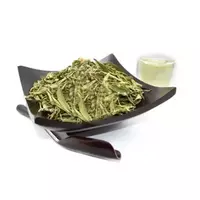Stevia tea

Stevia or Stévia belongs to the genus of perennial plants, which are assigned to the Astrovian family. Currently, science knows about 150 species of stevia. It is worth noting that stevia can refer to both shrubs and herbs. Appearance, chemical composition, and in addition, the distinctive properties of stevia will depend solely on the type of plant and distribution range.
Stevia occupied an important place in the ancient culinary tradition of the Guarani tribes, which inhabited the territory of the modern states of Paraguay and Brazil. Literally translated from the Aboriginal dialect, the name stevia of the species Stevia rebaudiana, which the Indians began to eat several thousand years ago, the word ka'a he'ê translates as "sweet grass. "
Stevia was used as a natural sugar substitute or sweetener. In addition, stevia was part of the formulations and infusions that were used in the treatment of certain types of diseases. Over time, stevia lost its popularity and relevance, as people began to use sugar from cane, as well as sorghum and beets as food.
However, interest in stevia has increased due to the need to invent low carb sugar. People paid close attention to stevia and "rediscovered" the plant. However, stevia leaves act not only as a sugar substitute, but also as a natural raw material used for the production of herbal or phyto teas.
Stevia tea is used not only as a tasty, but also a healthy drink. The properties of stevia tea allow to use the product in the diet of the therapeutic and preventive nutrition menu. The unique natural properties of stevia tea are used in the dietary nutrition menu of people with diabetes. Ordinary sugar is contraindicated for such people, and stevia-based sugar substitutes will not only be able to replace the so-called "white death, " but also bring invaluable benefits to the human body.
Often in the common people, stevia is called honey grass. Such a speaking name is not given to the plant by chance. In the old days, dried stevia leaves were added to herbal decoctions, and later to tea. You can purchase ready-made phyto tea from stevia in domestic grocery stores or pharmacies. In addition, you can make stevia tea at home.
To do this, add dried stevia leaves to black tea or any other herbal harvest. Regular consumption of stevia as food contributes to the normalization of blood sugar levels. This is very important for diabetics and obese people, the property of tea made of stevia allows you to classify the product as certainly useful for the human body.
Experts recommend regularly eating stevia tea for people with low blood pressure. In addition, the tea of their stevia helps to maintain immunity, and also prevents the development of tooth decay. Stevia tea helps with detoxification of the human body and can act as a bactericidal agent.
stevia tea 18 kCal
Energy value of tea from stevia (Ratio of proteins, fats, carbohydrates - ju):
Proteins: 0 g (~ 0 kCal)
Fats: 0 g (~ 0 kCal)
Carbohydrates: 0.1 g (~ 0 kCal)
Energy ratio (bj | y): 0% | 0% | 2%
 Español
Español Français
Français Português
Português Русский
Русский 简体中文
简体中文 繁體中文
繁體中文 日本語
日本語 한국어
한국어 العربية
العربية Türkçe
Türkçe Қазақ
Қазақ Deutsch
Deutsch Italiano
Italiano Українська
Українська
